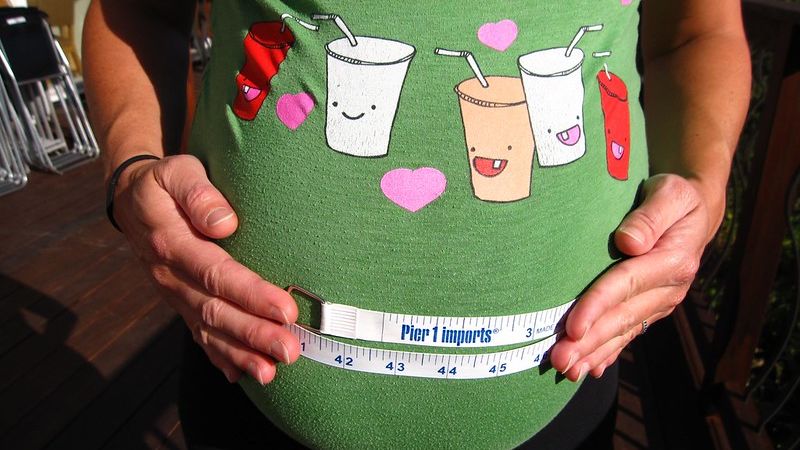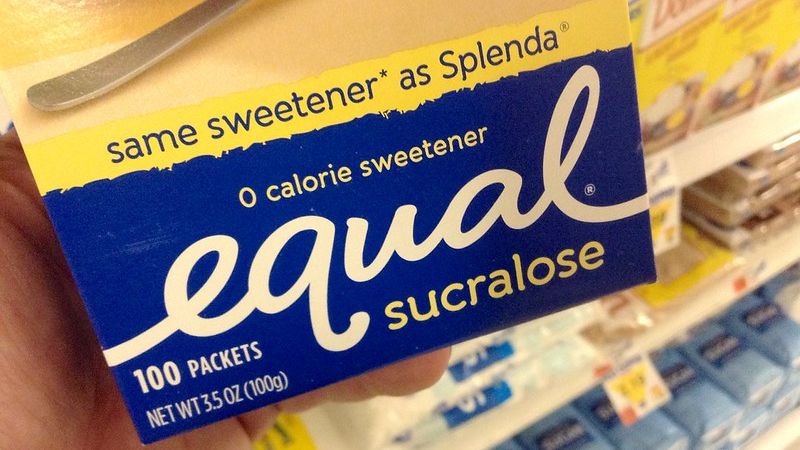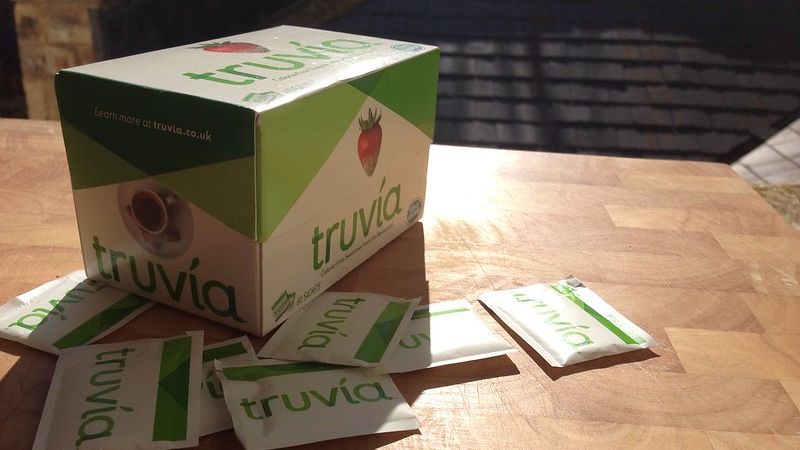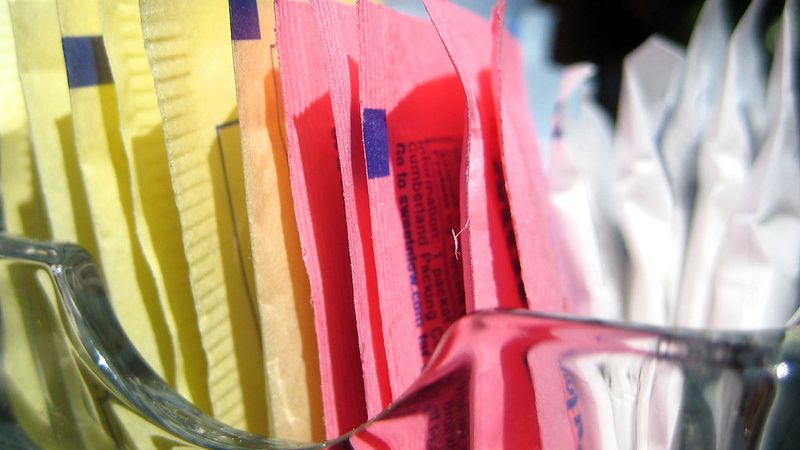Artificial Sweeteners

There is currently no evidence by United States or European regulatory agencies that approved artificial sweeteners, when used in appropriate doses, are harmful during pregnancy.*
Artificial sweeteners are considered safe during pregnancy when women stay well under the indicated Acceptable Daily Intake (ADI), which can be up to dozens of packets – therefore most women will never come close to the ADI.
Further, while some animal studies have shown possible taste-related changes in offspring, most of these studies provided doses hundreds to thousands of times higher than the human ADI.
*All individuals (including pregnant women) who have phenylketonuria, a genetic trait, need to avoid aspartame, which can cause fetal complications during pregnancy (see Aspartame). Women without this condition do not need to avoid aspartame.
Background
Artificial sweeteners are low- to no-calorie sugar replacements in foods and beverages that can be up to hundreds to thousands of times sweeter than table sugar. These sweeteners were originally developed for those who needed to replace glucose (sugar) in their diets, such as diabetics.
Up to approximately 45% of pregnant women are reported to consume artificial sweeteners; this number could be much higher as sweeteners are included in a wide variety of food and beverages to drive added sugar content down.
General Safety
Artificial sweeteners are regulated by the United States (U.S.) Food and Drug Administration (FDA) and the European Food Safety Authority (EFSA) in the European Union. They undergo rigorous testing prior to introduction in the food supply. However, in the U.S., products that are “generally recognized as safe” (GRAS) are unchallenged by the FDA and do not require approval (the only sweeteners considered GRAS are Steviol Glycosides).

Note: Regarding overall safety, these sweeteners are widely divergent in chemical structure; the safety of one sweetener cannot be extrapolated to all sweeteners, to include adverse findings.
In totality, artificial sweeteners have been deemed safe for all individuals when consumed under the daily recommended maximum amount, which can include dozens of the small, recognizable packets. However, there are certain side effects that can occur with artificial sweetener consumption, which may include gastrointestinal distress and headache.
Both U.S. and United Kingdom cancer organizations have indicated there is no evidence that sweeteners cause cancer. Further, diabetics are most susceptible, due to the necessary and much larger consumption of sweeteners in this population, and no additional increased risk of cancer has been shown in diabetics.
Some studies indicate a link between artificial sweeteners and a stimulating effect on appetite and, therefore, they may play a role in weight gain and obesity in adults; although this research is accumulating, it remains inconsistent.
All individuals – including pregnant women – who have phenylketonuria need to avoid aspartame (see Aspartame).
Pregnancy
A study published in October 2021 investigated human fetal exposure to artificial sweeteners by analyzing amniotic fluid and umbilical cord blood. Ten of 13 amniotic fluid samples contained at least one sweetener (study assessed four: ace-K, saccharin, steviol glucuronide, and/or sucralose). Despite this, although extremely limited, there is no consistent evidence that artificial sweeteners are harmful during pregnancy, but more research is necessary.
However, artificial sweeteners are rarely studied during pregnancy, and recent research has focused on fetal programming – the effect of sweeteners on the metabolic profiles (obesity, etc.) of the children of mothers who consumed sweeteners during pregnancy.
Again, while these findings are accumulating in both adults and children, overall, there is very little evidence regarding this effect on offspring, mostly due to different study designs, extreme doses, conflicting results, and the vast number of other factors than can influence metabolism, taste, and childhood body-mass index.

Additional (limited) studies documenting consumption of artificial sweeteners during pregnancy have reported associations with preterm delivery, allergic disease, fractures, congenital heart defects, and the risk of asthma. The mechanisms for how artificial sweeteners could lead to these outcomes is not clear.
A systematic review and meta-analyses from January 2021 found 'low' to 'very low' certainty evidence that "suggests daily [artificial sweetener] consumption during pregnancy is associated with an increased risk of preterm delivery, increased birth weight and decreased gestational age. However, as evidence quality was low, the authors noted that high quality research is necessary.
Data from animals reporting exposure at doses hundreds of times the ADI do not suggest an increased risk of malformations for most sweeteners.
The American Dietetic Association and the U.S. National Academy of Medicine indicate artificial sweeteners are safe to consume during pregnancy within acceptable daily intakes (see individual sections).
Additionally, because each sweetener is different in chemical structure, the wide variety of different types in different foods makes it harder for any individual to come close to the acceptable daily intake.
Aspartame
Brand Names: Equal®, NutraSweet®
Sweetness: 200 times sweeter than table sugar
Acceptable Daily Intake: 75 packets (based on 132 pound (lb)/59.8 kilogram (kg) person)
Aspartame is one of the most studied substances in the food supply. Aspartame was approved in 1983 (beverages) by the FDA after numerous tests showed that it did not cause adverse effects in laboratory animals; it was approved in 1996 as a “general purpose sweetener”. It is not often used in baked goods (as opposed to sucralose) as it loses its sweetness when heated.
Aspartame breaks down in the small intestine into aspartic acid, phenylalanine*, and methanol in children and adults. These breakdown components may cross the placenta to some degree, but are not considered toxic to fetuses, especially when consumed well under the ADI.
Aspartame has an extensive database (approximately 200 studies) demonstrating its safety. These studies, including investigations on fertility and embryo/fetal development, show no evidence that it causes birth defects, except potentially in pregnancies in which women have phenylketonuria.
*Phenylketonuria (PKU) is an inherited disorder that increases the levels of phenylalanine in the blood, causing intellectual disability and other serious health problems. Babies born to mothers who have PKU and uncontrolled phenylalanine levels have a significant risk of intellectual disability due to significant phenylalanine exposure before birth. Fortunately, PKU is readily identified in babies as part of routine newborn screening.

Although a 2005 study raised the possibility that very high doses of aspartame might cause lymphoma and leukemia in rats, a separate 2005 study from the National Toxicology Program (NTP) reported that aspartame exposure did not cause tumors in, or affect the survival of two types of, genetically modified mice. The NTP study used doses in rats comparable to human females of 630, 1,210, 2,490, 5,020, or 9,620 mg/kg for 40 weeks. The human ADI for aspartame by body weight is 50 mg/kg.
An additional human study (1985) noted a dose of 200 mg/kg of aspartame (4 times the ADI) did not lead to toxicity, such as methanol poisoning or increase in fetal blood phenylalanine levels to the range associated with intellectual disability in offspring. In this study, aspartame did not appear to readily cross the placenta.
Additionally, in 2013, EFSA published its first full risk assessment of aspartame, with experts concluding that aspartame and its breakdown products are safe for the general population (including infants, children and pregnant women).
Aspartame, is however, associated with increased weight of offspring, similar to other sweeteners. However, the study used mice given the 50 mg/kg body weight equivalent, which likely equates to around 92 packets or 17 diet sodas per day for an individual weighing 150 pounds. Male offspring in the study experienced greater weight gain, elevated fasting blood glucose levels, and decreased insulin sensitivity, while females had significantly raised fasting glucose levels.
Sucralose
Brand Name: Splenda®, Equal®
Sweetness: 600 times sweeter than table sugar
Acceptable Daily Intake: 23 packets
Sucralose closely resembles table sugar (sucrose) in both taste and chemical structure. The body does not readily absorb it, and 85% is eliminated in feces; the amount that is absorbed is eventually excreted through urine.

Sucralose was initially approved by the FDA in 1998 and then again in 1999 as a general-purpose sweetener. It is heat stable and therefore used readily in baked goods. FDA reviewed more than 110 safety studies in support of its approval.
These studies included reproductive research on rats that determined sucralose did not cause maternal toxicity, embryo toxicity, or fetal toxicity at dose levels up to 2,000 mg/kg of body weight/day. The human ADI is 5 mg/kg of body weight/day. Additional reproductive studies since its approval have also identified a lack of adverse effects. Further, sucralose does not appear to cross the placenta or enter the fetus.
Steviol Glycosides
Brand Names: Stevia® and Truvia®
Sweetness: 200 to 400 times sweeter than table sugar
Acceptable Daily Intake: 9 packets
Steviol glycosides are derived from the leaves of the Stevia rebaudiana Bertoni plant and are included as ingredients in numerous foods. Steviol glycosides have undergone a GRAS review that has not been challenged by the FDA and is, therefore, accepted as safe for the general public including pregnant women.

In animal studies, steviol glycosides did not increase toxicity in rat embryos, nor did they affect fertility or pregnancy outcomes. However, there are no data on outcomes during human pregnancies.
Note: Whole leaf Stevia and crude Stevia extracts are not approved by regulators as safe sweeteners due to inadequate reports regarding their safety as additives.
Several studies show that steviol glycosides may negatively decrease blood pressure in the general population, and therefore their use may need to be cautioned by those with cardiovascular concerns; however, this is preliminary research and more clarity is needed. There is no information regarding this effect during pregnancy.
Saccharin
Brand Names: Sweet and Low®
Sweetness: 200 to 700 times sweet than table sugar
Acceptable Daily Intake: 45 packets (based on 132-pound person)
Saccharin was discovered in 1879; it was the only sweetener available to diabetics until aspartame was approved in 1983. The FDA was not in existence until 1906, therefore saccharin did not undergo initial rigorous testing prior to its introduction into the market.

In the 1970s, saccharin was linked to bladder cancer from studies conducted on laboratory rats. However, since then, research has determined this effect can only occur in rats based on specific properties of the rat urinary system and does not apply to humans.
Based on this, saccharin was delisted in 2000 from the U.S. National Toxicology Program’s Report on Carcinogens, where it had been listed since 1981.
Like most sweeteners, saccharin does cross the placenta, but there is no data to suggest that exposure with doses 100 to 400 times the ADI increases the risk for malformations. Therefore, it is expected to be safe, even during pregnancy, when under the ADI. However, since saccharin appears to clear the fetus more slowly than other sweeteners, it is recommended that – out of caution – women try to use alternatives if and when available.
Advantame
Brand Names: No brand name
Sweetness: 20,000 times sweeter than sugar
Acceptable Daily Intake: 4,920 packets
Advantame was approved by the FDA in 2014 and has a chemical structure similar to aspartame but is much sweeter.
There is no data regarding the use of advantame during human pregnancy. FDA reviewed data from 37 animal and human studies, which did not show toxic effects in humans; animal studies on two different pregnant animals did not show adverse reproductive or developmental outcomes.
Neotame
Brand Names: NutraSweet® and Newtame®
Sweetness: 7,000 to 13,000 times sweeter than table sugar
Acceptable Daily Intake: 23 packets
Neotame, also similar to aspartame, was approved by the FDA as a general-purpose sweetener (except in meat and poultry) in 2002.
FDA reviewed data from more than 113 animal and human studies designed to identify possible toxic effects, including effects on the immune, reproductive, and nervous systems. Regarding the animal reproductive studies, rats were given 100, 300, or 1,000 mg/kg of body weight per day (human ADI equivalent is 0.3 mg/kg) and no adverse effects were identified in two generations of the studied rats.
Acesulfame Potassium
Brand Names: Sunett® and Sweet One®
Sweetness: 200 times sweeter than table sugar
Acceptable Daily Intake: 23 packets
FDA approved acesulfame potassium (Ace-K) for use in specific food and beverage categories in 1988 and again in 2003 as a general-purpose sweetener and flavor enhancer in food. FDA reviewed more than 90 studies support its safety, to include pregnant animals.
Ace-K is absorbed in the small intestine and is excreted by the kidneys in less than 24 hours without being metabolized, and although data is limited, it therefore is not believed to cross the placenta.
An animal study using doses substantially higher than human doses reported that fetuses exposed to Ace-K through amniotic fluid had an increased preference for sweet solutions in adulthood when compared with those in the control group.
Cyclamate
Brand Names: Sucaryl®
Not approved in the United States
Cyclamate was first approved by the FDA in 1951. After additional testing in 1967 showed bladder tumors in rats, the FDA banned the use of cyclamate in 1969. After a petition in 1973 by its manufacturer, cyclamate was denied again as a food additive in 1976 and 1980 when FDA determined it was still not shown to be safe.
Cyclamate is an approved sweetener in Canada, but only if sold directly to the consumer, not as an ingredient in food products. Further, it must be identified as such on a label, and the label must also contain a statement indicating cyclamate should only be used in foods under the advice of a physician.
Cyclamate is also approved in the European Union in a range of food products such as water-based flavored drinks, and in milk- and milk derivative-based or fruit juice-based drinks. The ADI equivalent varies from 250 to 1,500 mg/kg body weight/day depending on the food category.
Action
Unless specifically directed by their HCP, women do not need to replace the sugar in their diets with artificial sweeteners.
However, artificial sweeteners are currently considered safe during pregnancy, even when routinely consumed in beverages or other food items – as long as women stay below the recommended ADI for these products.
If women have any questions or concerns regarding artificial sweeteners during pregnancy, especially if diabetic, they should talk to their HCP.
Resources
Gestational Diabetes (American College of Obstetricians and Gynecologists)
A Healthy Pregnancy for Women With Diabetes (American College of Obstetricians and Gynecologists)